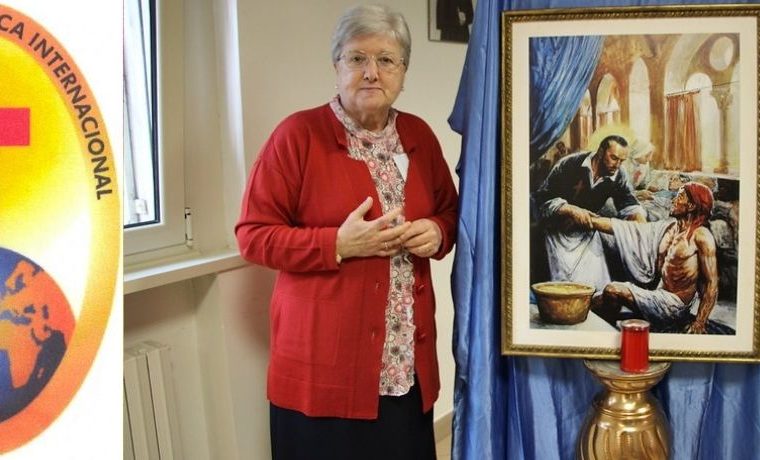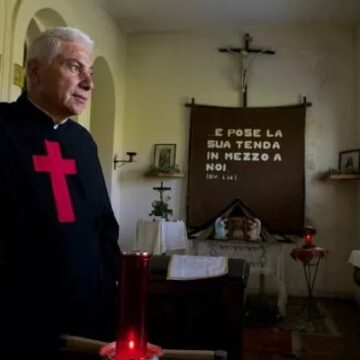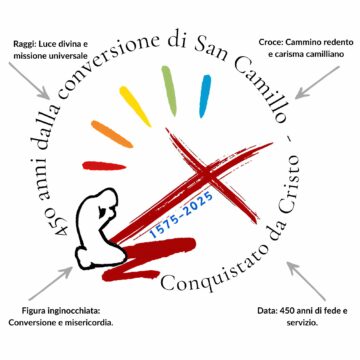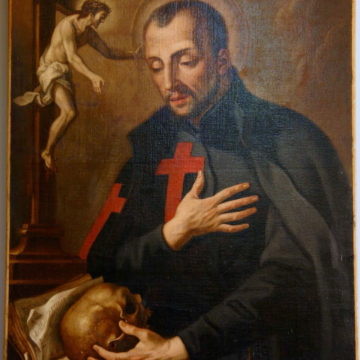 Dear friends of the Lay Camillian Family of the Province of North Italy, and spiritual assistants
Dear friends of the Lay Camillian Family of the Province of North Italy, and spiritual assistants
During this trying time that we are going through, which is full of uncertainties and at the same time of fear, I feel the wish to maintain and cultivate amongst us a cord that keeps us united despite everything.
It is not possible to meet each other but we can, and we wish to, feel ourselves a part of a great spiritual family, which is what the Lay Camillian family is, in our groups, in our Province of North Italy, but, at the same time, with the whole of the ‘Great Camillian Family’. This is a great spiritual family that at this particular point in time seeks to live and bear witness to the mercy of the Lord in the engagements of daily life.
It seems to me that a danger that is present today is to feel alone, perhaps isolated, which for some of us can also be a reality due to different circumstances.
In the CLF, at least as regards out experience in Italy, our ‘mission’ as Camillian lay people is carried out almost totally in voluntary work: in hospitals, in parishes, in the homes of sick people. Some of us are ministers of Holy Communion, at the side of sick people in particular, not only in a personal capacity but also on behalf of the Church community itself, which sends itself out and makes itself present, and near, through ministers in order to be comfort to so many people who feel the burden of not being able to take part in the life of the community.
The pandemic that we are still going through has deprived many people and many families of the gift and the comfort of the presence of those who go to them to visit them, to be with them for a little time, praying together, exchanging private matters and help. Indeed, because of the spread of the pandemic, health-care institutions, and in particular those who have elderly and disabled people, have from its beginnings been closed to visits.
I hear the same observation from many quarters. A feeling of loss because of loneliness brought about by an inability to communicate, albeit because of a correct concern not to infect people in a health-care institution, has created and increased problems. Indeed, at the outset we found ourselves almost paralysed, each person in their own homes with the resources that they had available. In old people’s homes family relatives were no longer able to enter and an attempt was made to obviate, with difficulty, the absence of physical contact, of being able to caress someone, through video calls which were not always possible.
After a number of months, when we thought we had got out of the pandemic, we are once again immersed in a situation that some define as serious, and we all know the news that we receive every day.
We are going through a period of ‘crisis’: can we obtain some aspect of positivity even at this moment? It is difficult to think that we can but it seems to me that this period, which is so difficult and burdensome, places us in a condition, forces us, to change our lives.
We think only of having to stop. Until a little time before the ‘total lockdown’ last spring, we were, some more, some less, full of commitments, things to do; almost all us had everything planned for each day. And we had to stop. And having to stop may also have wanted to tell us to learn to seize the opportunity to learn to be with ourselves, through reflection on our lives as believers as well. We are a Church, what does our being a Church tell us in this experience? What words does the Gospel of the Kingdom make ring out in us?
In the face of so much desperation, do we perceive signs of hope in ourselves and around us? I asked myself these questions, I also try to look around me, and to perceive small and large signs  and gestures of hope worked by those who are active every day in the front line, of those who put their own lives at risk to help, to comfort, to treat a sick person, an elderly person who is alone, a family in a state of difficulty. Those very many people who, in silence and simplicity, know how to be ‘neighbours’.
and gestures of hope worked by those who are active every day in the front line, of those who put their own lives at risk to help, to comfort, to treat a sick person, an elderly person who is alone, a family in a state of difficulty. Those very many people who, in silence and simplicity, know how to be ‘neighbours’.
There is so much searching in the men and women of today, searching for meaning to their lives which perhaps are off the radar screen; what comes to the fore seems to be living day to day. But let us also think of young people, of the problems that they are experiencing, because of the uncertainty of the future that lies before them. What meaning do they manage to give to their lives?
I do not want to offer a sermon. I only want to present you with, and share with you, some thoughts that will also give us a sense of our journeying today, in the situation that we are going through.
Msgr. Olivero, the Bishop of Pinerolo, fell seriously ill with Covid and then got better. To those who asked him what he felt during his most difficult moments when he thought that he was going to die he answered as follows:
‘What feelings did you have exactly?’, he was asked by his interviewer. ‘As though everything was evaporating, everything, all roles, everything. Do you know what remained: trust in God and the relationships that had been built. Yes indeed, only these two things were what I was. They were the two things that were firm within me, they were me’.
With all of this, specifically taking on board the testimony of those who have gone through the crucible of the disease, we grasp that in essential terms what remains is Love. Cultivating trust in the Lord, as people who believe, during this period, and nourishing, cultivating, in our communities trust in the Lord, through the witness of our lives, of our deeds, as well. I believe that there is a great need for this, in this epoch of ours as well. We do not manage to meet each other, it is true, but our membership of the LCF does not disappear.
We bear in our hearts and our prayers, every day, the sick, all those people who suffer, and in particular those who in addition to suffering also have loneliness, who feel abandoned. We feel that we are united, in the communion that is born in fraternity, and we feel that we are united with all those people, both lay and religious, who are active every day and often in difficult situations and situations of poverty, situations where there is an absence of instruments by which to provide care. We are aware of all those who cannot gain access to care in the various parts of the world. And the family relatives of people in extended care units and other institutions who cannot be at the side of their loved ones, whether elderly or disabled, or even young people, is a suffering that is added to other suffering.
I would like to reproduce here some excerpts from an article published in Avvenire by Marina Corradi:
‘When it is said, perhaps to reassure ourselves, ‘only the elderly die’, it is said that the pandemic is breaking down the oldest and deepest fabric of the country, the warehouse of memories and treasures. But, some reply, it is well known that at a certain age we die: thus we have here the nature of things. Not completely, in truth. Let us look at this ferocious harvesting from close at hand.
How many people are dying alone. A sudden temperature, the wailing of ambulances that abruptly stop outside the main door of the house, swift steps on the stairs. And you have to go, without your child at your side, without anybody. For a very long time nobody has died like that in Italy, except in remote epidemics. Imagine a married couple who have spent fifty years together who in a moment are separated. ‘No, Signora, you have to stay’. An elderly woman immobile at the door who watches her life go away. And the man who is going away, how much is his heart beating in his chest? Unknown faces, kind but anonymous ways of doing things, and medical doctors and nurses with equipment who are unrecognizable. Perhaps our elderly people look for their eyes from the stretcher, and perhaps they manage to find them, and those eyes look at them with humanity.
But the patients are very many in number and the doctors have to go. The children of the 1930s remain with a mobile phone in their hands that they do not know how to use well and only as long as they have the strength to speak. Dying alone is the heartbreaking destiny that in these past days has once again befallen a generation. Incredibly, in this hyperconnected world, people die alone. But on the other hand on the other side of the city, let us remember, the survivors of those couples of very long standing are now alone. And perhaps at that age being without the companion of a whole life is worse than dying. By now the lives, the voice, the expressions and the breathing during sleep of the other person are inextricable and a part of the other person of the couple. Thus when they disappear, people feel mutilated. ‘Only the elderly die’, if that professor is right…And yes, as old people, whatever the case, we die: but how much invisible and scorching suffering is to be found in the simultaneous departure of so many! Faces furrowed by time, with everything to leave behind them, what is dearest to them…Very many empty houses will be found in our cities. I don’t’ want to engage in idle chatter, but respect and concrete solidarity and a prayer for each one of those ‘old people’ who die alone or find themselves alone. A prayer for each one of those four hundred who die every day.
And there comes to my mind a prayer that is absolutely secular – the verse of a song by Roberto Vecchioni: ‘we will meet again but many, many, moons in the future’. And I do not know how many moons in the future, or if, instead, very soon, but: you will meet again. As we were promised, in Christ. For always, as you promised each other, on a distant day. These are words of hope that should not be forgotten.
In the same way as the words spoken by Pope Francis on 27 March of this year in St. Peter’s Square are words of hope: ‘The Lord asks us and, in the midst of our tempest, invites us to reawaken and put into practice that solidarity and hope capable of giving strength, support and meaning to these hours when everything seems to be floundering. The Lord awakens so as to reawaken and revive our Easter faith. We have an anchor: by his cross we have been saved. We have a rudder: by his cross we have been redeemed. We have a hope: by his cross we have been healed and embraced so that nothing and no one can separate us from his redeeming love. In the midst of isolation when we are suffering from a lack of tenderness and chances to meet up, and we experience the loss of so many things, let us once again listen to the proclamation that saves us: he is risen and is living by our side. The Lord asks us from his cross to rediscover the life that awaits us, to look towards those who look to us, to strengthen, recognize and foster the grace that lives within us. Let us not quench the wavering flame (cf. Is 42:3) that never falters, and let us allow hope to be rekindled.
Affectionate greetings to each one of you, to your families, to our Camillian friends. Let us remain united in prayer.











